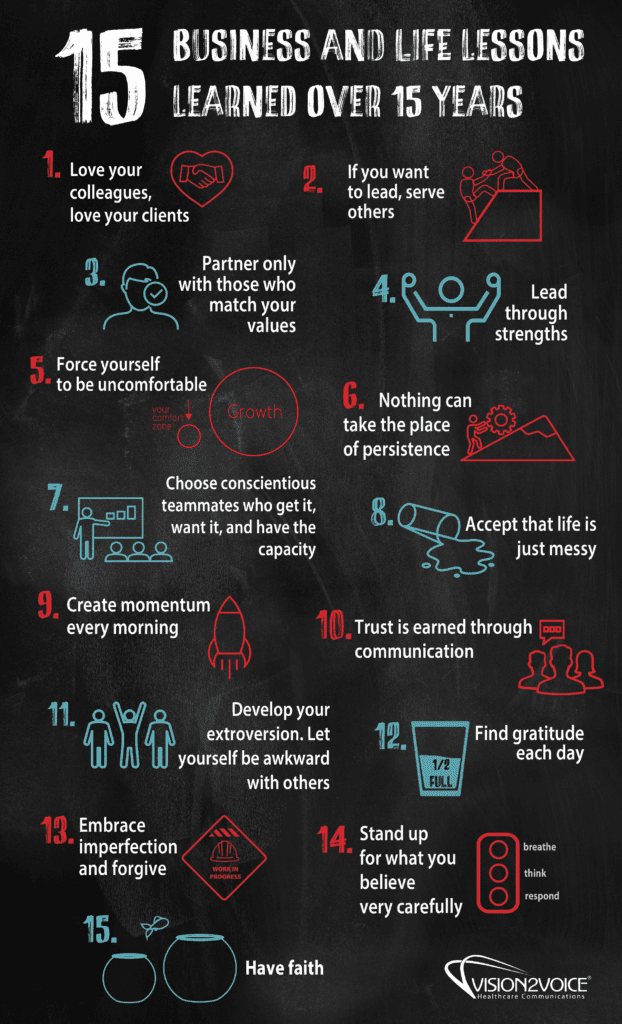Since Vision2Voice opened our doors in 2008, I’ve been both honored and humbled over these past 15 years. Looking back on my personal and professional growth as a business leader, as well as a colleague, mentor, and friend, I’ve learned many lessons along the way. Here are just a few:


Love your colleagues, love your clients
“Love one another” isn’t just one of the most famous lines spoken over the past 2000 years because it sounds nice. It’s because we are called as human beings to love. Loving one another is respecting one another, and it is a thousand times more powerful than hate. Love is the route toward peace. When you have peace in your life, your health is better, your choices are more careful, people want to be with you and will rally around you in a crisis.

If you want to lead, serve others
The deepest fulfillment and most meaningful life come from serving others. Serving others is the shortest route to finding happiness in your job. Serving can include helping your team with their priorities, pitching in to support your manager on a project, empathizing with someone who suffered a loss (a loved one, a pet, etc.), praying for a stressed colleague, or providing a cup of coffee for a coworker. By doing kind things for others, you’ll foster a company culture that does the same.

Partner only with those who match your values
It seems to me that the most painful relationships are those that didn’t first align with shared values. People often choose life or business partners who don’t align on the important things, they just fill a temporary need. Persist until you find the right people who match your values. That means you must first know what your own true values are.

Lead through strengths.
Identify the strengths of those who you work with and place them in roles that fit those strengths. Work is much more enriching when people can do what they are inherently good at. According to a Gallup study, people who focus on their strengths are six times more likely to be engaged on the job.¹

Force yourself to be uncomfortable
We all seek comfort, yet comfort is the enemy of growth. The problem with being comfortable is that we as humans cannot change course until we first feel uncomfortable with what we are doing. In some aspects of our lives, we might have it figured out and don’t need to change. Most of us, however, have a genuine desire to become the best version of ourselves. Continuously evolving and growing requires a growth mindset. Until the day I die, I never want to stop working toward the best version of myself.

Nothing can take the place of persistence
V2V was founded in the heart of a recession when many businesses were failing and laying off workers. Launching the business at that time was the right decision because talented staff were available and looking for jobs. If I had taken the advice of so many, I would have waited until the time was right. From my parents, I learned to get going—to start, to build momentum, and persist. As Calvin Coolidge said, “Persistence and determination alone are omnipotent…the slogan ‘press on’ has solved, and always will solve the problems of the human race.”

Choose conscientious teammates who get it, want it, and have the capacity
Don’t just hire someone who is skilled in their craft or create a partnership with someone who wants to work for you. We often assume that others have the same skills, insights, understanding, respect, and capabilities to be successful on our team. Once you’ve done that, ensure that they have high levels of conscientiousness. Anyone can tell you that they get it, they want it, and they have the capacity for it, but take time to measure their levels of reliability, work ethic, and goal-oriented behavior. Once you’re aligned and you’ve spent the time to secure these team members, have no fear.

Accept that life is just messy
Nature didn’t create straight lines and 90° angles—humans did! Life is messy and every person I’ve ever known has to deal with messy situations. Yet, the mess isn’t the real problem; it’s the belief that everything should be perfect, neat, and orderly. Be gentler on yourself and put yourself in someone else’s shoes. We all have challenging life circumstances. People lose jobs, children get sick, and tragedies happen. Accepting that life is difficult for everyone will allow you to more easily empathize with others.

Create momentum every morning
When you wake up, make your bed. Why is this so important? For two reasons: it’s great for your mental state of mind to start the day by achieving something. Second, at the end of a long day, you will get into your bed that you made. You can look back at the day—good or bad—and recognize that you had achievements, no matter how small.

Trust is earned through communication
Trust can be lost in a flash. When interacting with others, we can do a lot of great things, but trust can be diminished each time we misstep. Sometimes even the perception that there is a misstep can result in mistrust. So often, talented people aren’t trusted and don’t understand why. You control your trust and the perception of your trustworthiness. Earning trust is always built based on optimal communication. Learn how to meet people where they are with their communication needs and your trust will endure.

Develop your extroversion. Let yourself be awkward with others
It’s easy to put our heads down and grind. Working from home, for example, allows you to get your work done. Yet, at what cost? Leadership is built on key interactions with other people. Developing your extroversion skills by being with others is necessary to become a trusted team player and collaborating in person is usually better than virtual interactions.

Find gratitude each day
Set up a practice of gratitude to acknowledge the goodness in your life. Being grateful helps us realize something larger than ourselves is at work in our lives. Say “thank you.” Pray. Meditate. Write a thank you note. Gratitude can help you feel more positive, relish good experiences, improve your health, deal with adversity, and build strong relationships. Always remember that our interconnectedness is what helped us achieve the successes we’ve had.

Embrace imperfection and forgive
When things don’t go right, own up to the problem, forgive yourself, and realize that we are all going to err. When someone else does something wrong, talk to them and discuss the impact of their actions. Find a model that works for you to have crucial conversations, then forgive their actions and move on.

Stand up for what you believe very carefully
Relationships are fragile. When your buttons get pushed, find a way to hold your emotions so you can remain calm and logical. Maybe take a deep breath and think before responding. If your gut still tells you to respond, choose your words carefully and prepare to pause and let the other person respond.

Have faith
When things are tough, remember that they will always get better. Things are rarely what they seem to be. Ask yourself if the issue was a tragedy or an inconvenience; you’ll find that tragedies are rare. When difficulties amount in your day, give yourself some downtime to recover and recuperate. When you wake up the next day with a fresh start, things never seem as bad. So have faith in what you cannot see—that things will get better. Then go home and sleep in your well-made bed.
Have a pearl of wisdom you’d like to share from your own journey? I’d love to hear it! Contact me at drehal@vision2voice.com
1 Asplund, Jim, Seven Reasons to Lead with Strengths, September 12, 2012, https://www.gallup.com/workplace/236930/seven-reasons-lead-strengths.aspx





